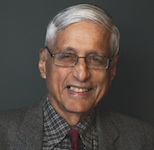Debating Partition, the Oxford way
Cyril Radcliffe is a favourite whipping boy. Though he had never been to India before 1947, he nonchalantly drew lines across Punjab and Bengal and returned home, allowing South Asians thereafter to butcher one another.
Laali Vadlamani, the young woman whose term as the Oxford Union president is just ending, is perhaps the first Telugu-origin person elected to that prestigious post. Other South Asians who have held that office include Benazir Bhutto and Tariq Ali from Pakistan, Lalith Athulathmudali from Sri Lanka, and India’s Girish Karnad and Montek Singh Ahluwalia.
That the Oxford Union is primarily a debating society and holds debates on major issues, including controversial ones, is well known. A recent one, held on March 1, was on the motion, “This house regrets the Partition of India.”
Invited to participate, I chose to speak for the proposition. Also slated to speak in favour, P Chidambaram, the former finance minister, was at the last minute unable to take part. The London-based commentator and author of a new book on Netaji’s death, Ashis Ray, spoke ably in Chidambaram’s place.
Salman Khurshid, the former foreign minister, and Mridula Mukherjee, history professor at Jawaharlal Nehru University, spoke against the motion. Evidently concerned about reactions at home to what they might say, the Pakistanis and Bangladeshis requested to take part had declined.
Along with much of the UK, Oxford was hit on March 1 by a snowstorm, but despite the extreme chill, the late-night debate was attended by a full house.
Two outstanding student speakers opened: Sabriyah Saeed, who is of Pakistani origin, and Eric Sukumaran, who hails from Kerala. Half a dozen other students raising their hands, most of them looking South Asian, were also invited by President Vadlamani to speak.
Not surprisingly, the motion was comfortably carried. Speakers against it had argued persuasively that the future was of greater moment than the past. Though it can teach us, the past cannot be changed. It has to be accepted, not regretted.
Speakers for the proposition said that regretting the Partition did not imply a wish to undo it. To think that Independence was possible only through Partition was not correct.
Also, following Partition, religious majorities in both halves became preponderant majorities, capable of turning into oppressive majorities. The possibility of a nuclear war was certainly one of Partition’s unfortunate gifts.
When the debated ended, students of Pakistani and Bangladeshi origin besieged the Indian speakers, said thanks for the debate’s civility and voiced longings for reconciliation in South Asia. It was obvious that free and frank dialogue among South Asians, currently almost unthinkable in Karachi or Mumbai, Delhi or Dhaka, is possible in the UK and elsewhere outside India.
To underline this possibility is one reason for writing this piece. The other is to say that it is time for South Asians to move beyond lambasting the UK for India’s Partition.
Most speakers in the Oxford debate referred to Britain’s divide-and-rule policy. Thus, I reminded the audience that in the summer of 1945, Winston Churchill had asked Viceroy Archibald Wavell — as the latter noted in his journal — to ensure India’s division into “Hindustan, Pakistan, Princestan, etc.”
However, the chief responsibility for what happened in 1947 must rest on the shoulders of the people and leaders of the Subcontinent. Churchill, Mountbatten, Radcliffe and company could never have imposed Partition or the accompanying carnage on South Asia had the people living there in 1947 been determined either to stay together or to separate peacefully.
Cyril Radcliffe is a favourite whipping boy. Though he had never been to India before 1947, he nonchalantly drew lines across Punjab and Bengal and returned home, allowing South Asians thereafter to butcher one another. Satirical poems and cartoons were inevitable.
He was whipped afresh during the Oxford debate. But wait. Radcliffe drew his lines because his fellow judges, four in Punjab and four in Bengal, all of them Indian, half of them Hindu or Sikh and the other half Muslim, could not agree. They cancelled one another, and Radcliffe drew his lines.
If Indian judges had found agreement then, Radcliffe or no Radcliffe, the Indian people would have been given an acceptable solution and acceptable borders, and Partition might have happened without carnage.
Indians, Pakistanis and Bangladeshis can lambast the British to their hearts’ content but that will not change South Asian realities. The lambasting occurred in Oxford, and the British audience took it on the chin. No one objected, no one booed, and no one asked why the attackers had been given UK visas.
The young woman from the Telugu world, presumably a Hindu, became the Oxford Union president. Another young woman, presumably a Muslim, whose grandparents were Sindhi on one side and Jalandhari Muslims on the other, was elected the Union’s “Librarian”, also a post of prestige. These two and their white and South Asian associates in Oxford organised a meaningful debate on India’s Partition.
The event was a plus for Oxford but also for the UK. Spitting fire at the British is easy. Organising in India a candid yet civil debate about river waters, Nagaland, Kashmir, Chhattisgarh, or minority rights is another cup of tea.
Nations that sprout such debates have led the world. Nations that cannot tolerate such debates will not be loved or followed by the world, no matter their GDP, their populations, or their percentage of the young.
This article first appeared in the Indian Express
